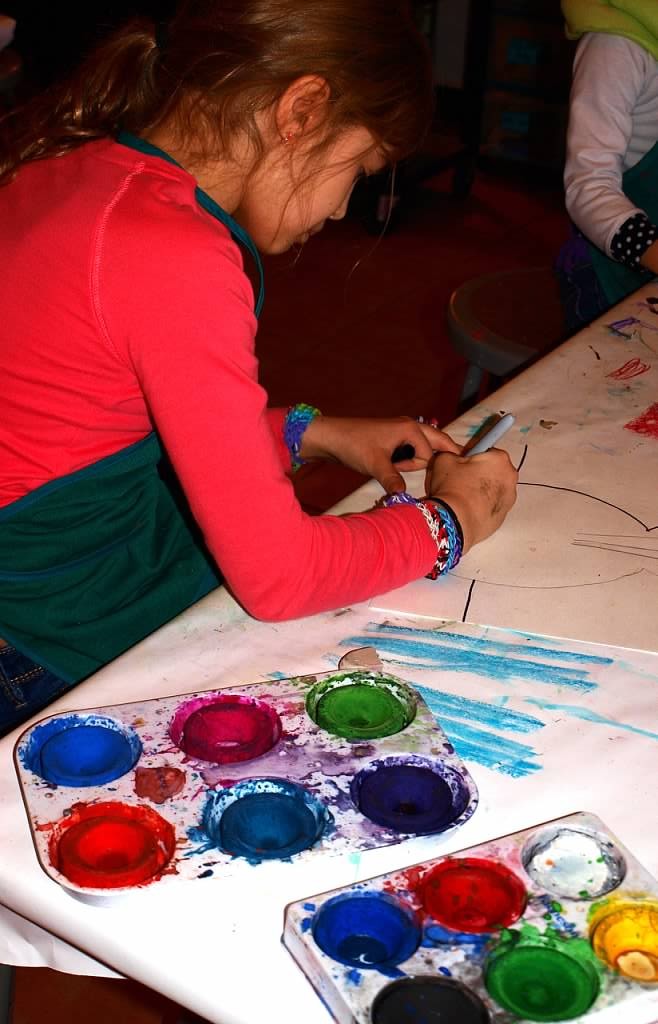7 Ways to Engage Your Creative Children
February 22, 2015 Leave a Comment
 I love that my daughter loves art and music, and I’ve dedicated a large part of our fairly small house to art supplies and her projects. I also know that how I respond to my daughter’s creations affects her deeply. Courtesy of PBS Parents, Patti Saraniero at ArtsEdge.org gives us seven suggestions about how parents can talk with their kids about their creative work.
I love that my daughter loves art and music, and I’ve dedicated a large part of our fairly small house to art supplies and her projects. I also know that how I respond to my daughter’s creations affects her deeply. Courtesy of PBS Parents, Patti Saraniero at ArtsEdge.org gives us seven suggestions about how parents can talk with their kids about their creative work.
1. Be thoughtful.
Your young artist has put effort into his work. Generic praise that we all use -“that’s great, honey” -gives us away that we aren’t really looking or listening. It can be discouraging. On the flip side, highlighting a weak spot in the artwork can also undermine a young artist. Often your artist is aware of where the artwork doesn’t work as well. If your young actor cannot be heard from the stage, encourage him to talk about what he is doing well and what he wants to continue to work on. When your actor identifies that he needs to better project his voice, offer to help. If he says no, accept that, but be willing to lend a hand when your child is ready for your help.
2. Don’t take over.
For parents who have a special ability or interest in the child’s art area, it can be tempting to “help.” Hold on. Let your child find her own way and wait for her to invite your participation. For example, let’s say the theater has been a very important part of your own
 childhood and adulthood. It makes sense that you would want your children to enjoy it, too. So absolutely take your kids to the theater. Speak to them afterward about the experience, and let them know that you are willing to take them again.
childhood and adulthood. It makes sense that you would want your children to enjoy it, too. So absolutely take your kids to the theater. Speak to them afterward about the experience, and let them know that you are willing to take them again.
3. Get beyond yes and no.
Use open-ended questions that encourage your child to discuss or explain his work. Listen closely to what he says. Try asking “Tell me about your sculpture” rather than “What is that?” Questions such as “What was your inspiration for this song?” encourage young artists to articulate their artistic thinking and process. The arts offer a valuable opportunity for children and teens to practice self-reflection.
4. Teach to learn.
Ask your young artist to teach you about the arts concepts and skills she learned to create the artwork. Teaching is a great way to reinforce learning and build mastery. What kid doesn’t love the opportunity to show an adult how something is done?
5. Encourage the process.
The artistic product is what you see at the end of your child’s hard work. The process of creating the work is as valuable as the product -and, for many kids, more so. When producing a piece of art, student artists must create, revise, polish, and persevere. All of these experiences are useful both in and outside of the arts. Music, dance, and theater rehearsals are great opportunities for your artist to practice not only the art form but also collaboration, compromise, and patience.
6. Effort counts.
Not every artistic product will be perfect (or even “good”). Interestingly, it may be the effort put into creating it that matters more in the end. In each of the arts, there are technical skills that need to be developed. Not every child may be artistically gifted, but with education and practice, every child can develop artistic skills. Encourage practice. Remember the old joke, “How do you get to Carnegie Hall? Practice, practice, practice…”? The reason the joke still works is because practice matters!
7. Let their light shine.
Find ways for your child to share his work if he chooses to. With visual artwork, encourage your child to photograph his work to create a digital “catalog” of his accomplishments. Videos and recordings of performing artworks also allow student artists to “collect” their body of work.Parents are an artist’s first and often unabashedly best audience. Whether your young artist has career aspirations in the arts or not, your support, interest, and commitment underscore the importance of her artistic work and viewpoint. Remember, the arts are valuable ways for kids to make sense of life and the world. You can further illuminate the way for them.
For more articles about kids and the arts, visit pbs.org/parents.
 Passport
Passport





